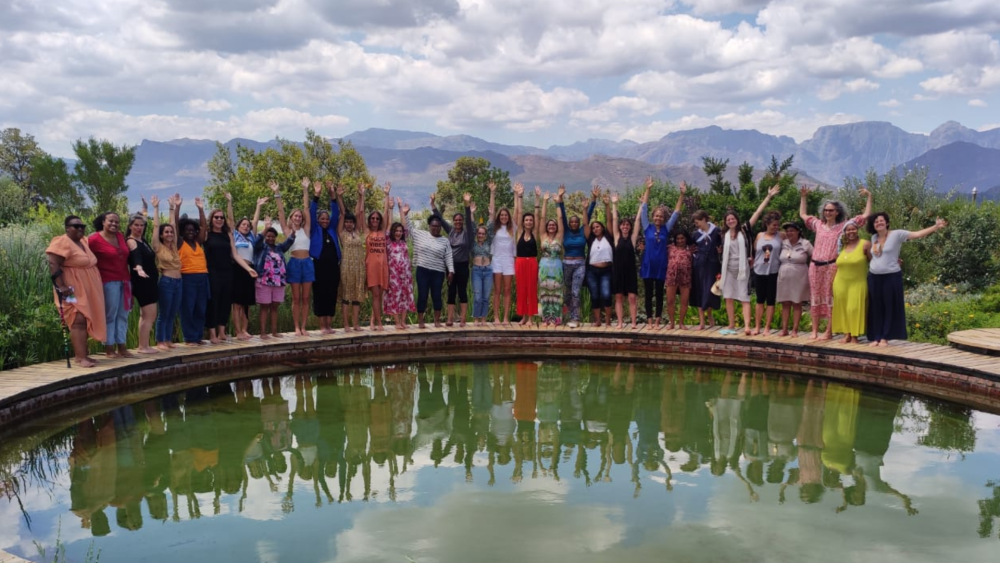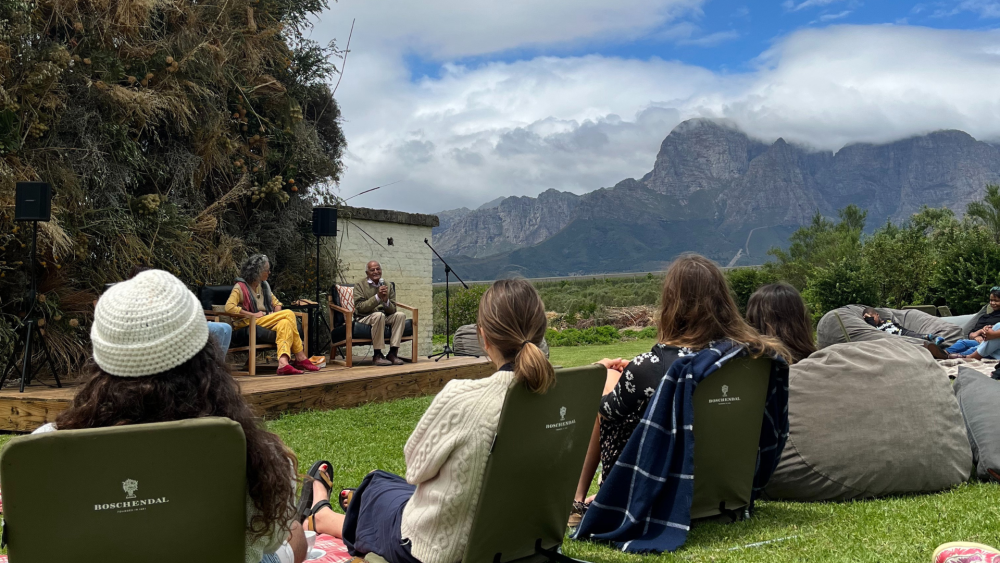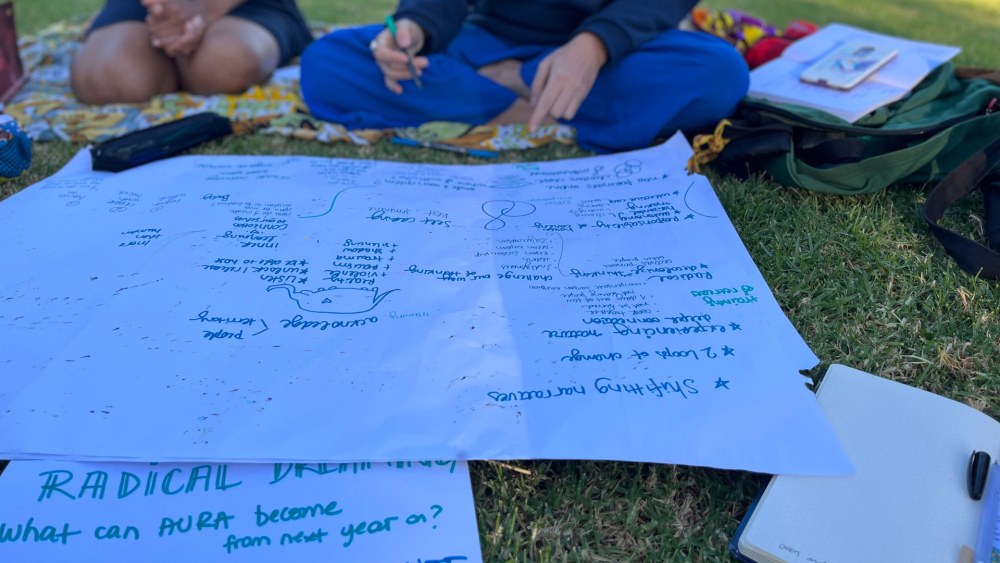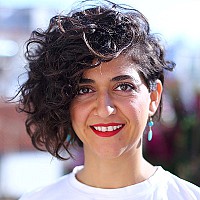Radically (un)learning: Fellowships that invite you to un-discipline your methods

“In a world of uncertainty and not knowing, the Aura Fellowship is a counter-culture. Too frequently the response to a crisis is part of the crisis. Attempts to solve intractable climate problems are often tried from the same mind that created them in the first place. In urgent times, the pressure is on for technical solutions, speed, progress and sure outcomes. Our dream in the Aura Fellowship is to co-create spaciousness, discernment and humour as contributions to the long game. Let women lead the way.” Aura Fellowship, Be the Earth Foundation
The drive felt long, after an eleven hour overnight flight. The road, once out of Cape Town city traffic, revealed large plots of green lands bordered by endless stretches of mountains. I was not sure where I would be spending the next 5 days of a retreat to wrap up a 2-year journey with the Aura Fellowship - an opportunity I feel very privileged to have been chosen for. I was eager to meet the faces of the other nine women - and three mentors - whom I had been regularly meeting with online every month, for a full two twelve-month cycles.
I arrive to Boschendaal, a place tucked away between a mountain range, in a quiet valley, covered by farmland. I am guided through a pebble path to an open air stage, suspended in the middle of lush green grass, and framed by the picturesque majestic mountains around it. I look for familiar faces I had only seen on Zoom for the past two years, and tuck myself on a blanket on the grass next to one of them to listen closely.
On the stage are the founders of Be the Earth Foundation, Renata and Seth, who explain that in the spirit of philanthropy done differently, our conversations will start by grounding ourselves in the territory with a dialogue around land. Among those who came onto that stage were Eve, an Ecologist, writer, Bertha Fellow, founder of Lynedoch EcoVillage and the Sustainability Institute in South Africa, and one of my mentors in the fellowship; Satish, a peace-pilgrim, life-long activist and former monk, and Dionette, a local woman whose family lived on - and were displaced from - this very land we are gathered on; a history mired with the legacy of colonisation and (neo)slavery.
Immediately, the powerful setting of this land and its history came center-stage, and would not leave me for the rest of my time in this retreat, shaping my every interaction.
After this welcome, the group is reduced to only the women who are part of Be the Earth’s programs, 30 in total, including the Aura Fellows of whom I am one of ten. I found myself surrounded by some of the most powerful women I had yet met, activists fighting for indigenous rights in the Amazon, farmers fighting for land and food justice, even app developers supporting farmers; mothers, daughters, and sisters. I struggled to situate myself amongst them, having returned to academia to complete a PhD after a career working in water advocacy. As an Early Stage Researcher with NEWAVE, I am now researching social movements that have succeeded to change local water governance in their city and are bringing water back to the commons. However, I recognize and continue to struggle with the fact that I am not the one on the frontlines.
This fellowship helped me find a way to weave my role as a researcher with my advocacy and activism. It is unlike any other fellowship I had heard about before - it is genuinely a counter-culture. Intentionally designed to be by invitation only, it gave autonomy to the fellows to decide both individually and collectively on the respective dynamics, finances and shaping of the fellowship itself. It offered mentorship support over the duration of 2 years to focus on care and creativity in areas of our lives that - as women - we felt important, but lacking. We were not asked for anything in return, other than to show up in a circle (part of the methodology is Circle Practice), and tell our stories when we felt ready. We were not required to report, nor questioned about our choices of mentorship. A gift culture of sorts, in contrast to a productionist model requiring visible returns on investment.
We were invited to practice rest and silence - two radically important gifts that an always-busy capitalist system has rid us of. I could deeply relate to this invitation. Empty space, they called it - the nepantla.
Nepantla, thresholds, and liminal space, were all concepts that reverberated in my researcher mind as I navigated my way through the fellowship. Something about these concepts felt intriguing, and deeply relevant. I came to the very insight that my research itself explores thresholds - the spaces of transition and transformation - that permit radical alternatives to emerge as counter-narratives to dominant ways of doing (in my case ‘water governance’). These often ‘anomalies’ point us to the cracks in the system from which not only change, but deeper and sustained transformation can manifest. They help us unravel how new institutions can be designed towards regenerating our commons.
To contextualize it better, I am specifically exploring how citizen-driven de-privatisation and re-municipalisation of a city’s water service can create the necessary threshold to permit new forms of “tinkering” or alternatives to emerge. One such tinkering is to enable practices of water recommoning - citizens reclaiming water as a commons, governed under collective stewardship that transcends premises of ownership. This concept can provide an interesting lens to the study of actor subjectivities in the scope of how water movements are shaped by water and are consequently re-shaping water governance.
The Aura Fellowship, just like the organisation behind it, is said to be premised on feminine governance principles. There is care in every process, co-creation of intentions and outcomes, and a slow undercurrent for deep transformation rooted in systemic change, specifically working where the gaps of capitalism are most felt.
Why women? It is not a coincidence. There’s a direct link between women in power and environmental stewardship, like this 2019 study that found that female representation in national parliaments across 91 countries correlates with more stringent climate change policies and lower carbon emissions.
In a time when leaders are failing to guide us through and out of complex and interconnected crises (from climate, to water, to food and energy): how can we enable leadership that disrupts systems of exploitation, and facilitates cultures of care and stewardship of our common resources? How can we encourage ‘pluriverses’ where experiments for alternatives are created and sustained? How can we shift power by knowing when to step back, for someone else to step forward? Asking these questions facilitates the beginning of a much longer and deeper decolonization/re-indigenisation process.
These are questions to continue asking ourselves, also as academics. How can we radically (un)learn? How can I, as an academic researcher in water governance, undiscipline my thinking and methods in ways that may seem radical, but that enable deeper and necessary transformation in my own work?






